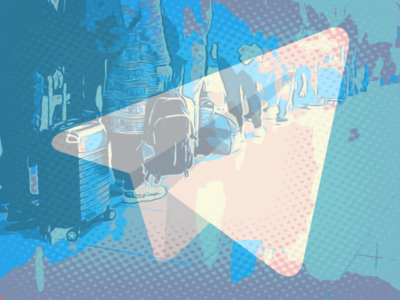
Foto del archivo personal de Hanna Liubakova. Usada con autorización.
Hoy, el lema de la oposición bielorrusa «Жыве Беларусь» [¡Viva Belarús!] fue declarado «símbolo nazi prohibido«. El actual régimen bielorruso se considera una dictadura respaldada por el Kremlin que reprime brutalmente toda disidencia política. En 2020, las protestas sacudieron el país, cuando su líder Aleksandr Lukashenko afirmó haber ganado las elecciones nacionales por sexta vez consecutiva. Svetlana Tsikhanouskaya, exprofesora de inglés y esposa del bloguero y activista encarcelado Siarhiej Tsikhanousky, fue la principal oponente de Lukashenko durante las elecciones, y se celebraron protestas en su apoyo. La Policía bielorrusa las dispersó brutalmente, con al menos un muerto y miles de encarcelados. Tsikhanouskaya abandonó el país y desde entonces representa oficialmente al Gobierno bielorruso en el exilio.
Recientemente, Global Voices publicó un artículo sobre la continua resistencia contra la guerra y la dictadura en Belarús. El artículo se basaba en un hilo de Twitter de Hanna Liubakova, que usa su cuenta de Twitter para publicar noticias sobre Belarús en inglés que son difíciles de encontrar en otros sitios web. Liubakova también ha escrito para Global Voices, y accedió a hablar de su último trabajo con los medios bielorrusos y el activismo.
Global Voices (GV): Cuéntanos de ti, de tu relación con el activismo y el periodismo en Belarús.
Hanna Liubakova (HL): I am a journalist from Belarus. I left the country in 2020, because even before the elections and protests, I was surveilled. I knew that I would need to leave. I joined the Atlantic Council while I was still in Belarus, but then I got this sort of signal that it was better for me to leave the country. Now I report about those protesters from exile. I am currently a non-resident Fellow at the Atlantic Council, which is a Washington DC based think tank. I also work at several organizations that focus on media development. And we work with the Belarusian outlets. Some of them are still inside the country but there are also those who fled the country. Our main focus now, and one of our priorities is how to reach those neutral audiences inside Belarus, how to deliver news to them, how to make them interested in political news. Right now, their news consumption is mostly around non-political news. So, we are focusing on how to make them interested in politics, in human rights, in current affairs in general. And my other priority as an expert is to provide information about Belarus to foreign media. I publish this via Twitter or by the Atlantic Council or speak at conferences.
Hanna Liubakova (HL): Soy periodista de Bielorrusia. Salí del país en 2020, porque incluso antes de las elecciones y las protestas, me vigilaban. Sabía que tendría que marcharme. Me uní al Consejo Atlántico cuando todavía estaba en Bielorrusia, pero entonces recibí una señal de que era mejor que abandonara el país. Ahora informo sobre esos manifestantes desde el exilio. Actualmente soy becaria no residente en el Atlantic Council, grupo de expertos con sede en Washington DC. También trabajo en varias organizaciones que se centran en el desarrollo de medios. Y trabajamos con medios bielorrusos. Algunos siguen dentro del país, pero algunos salieron. Nuestro principal objetivo ahora, y una de nuestras prioridades, es cómo llegar a esas audiencias neutrales dentro de Bielorrusia, cómo ofrecerles noticias, cómo hacer que se interesen por las noticias políticas. En este momento, su consumo de noticias se centra principalmente en noticias no políticas. Así que nos centramos en cómo hacer que se interesen por la política, los derechos humanos y la actualidad en general. Y mi otra prioridad como experta es informar sobre Bielorrusia a los medios extranjeros. Lo publico a través de Twitter o de Atlantic Council, o intervengo en conferencias.
GV: Recientemente has impartido una formación para periodistas bielorrusos sobre temas que pueden interesar a los medios internacionales. ¿Podrías hablarnos un poco más de eso? En concreto, ¿qué temas crees que pueden ser interesantes para atraer de nuevo la atención de los medios internacionales hacia Bielorrusia?
HL: Before I did the training, I asked a question on Twitter, in order to get the response from foreign and Belarusian journalists and editors who follow me, about what would be the topics that attract the attention of international media to Belarus. I received some great responses from editors, which were really interesting. I think the most important and really relevant [thing] for us is that the resistance is not over, and I think that Global Voices had also emphasized this in the recent publication already. That is very important, what is happening inside the country. We have to show that it's not just that the Belarusians are siding with Russia, with the Kremlin, and they support it. Because that's what many people think and they have this stereotype in the West. I suppose that it is really difficult to see resistance when there are no protests, when we don't see those pictures of hundreds of thousands of people on the streets. And of course, I understand why people think that the revolution is over, but it's not the case. We see the resistance, and there are so many interesting developments and initiatives inside the country. There are many people who tried to stop the movement of Russian troops or who protested in some other way. They are jailed, and the repercussions are really harsh. But this is happening. Also, what many people do is they share information. They are inside the country. And they became citizen journalists for us, and they share this information with us. That is how we are able to follow what's happening inside. It also shows their interest, it shows that they are against regime, they're against the deployment of Belarusian troops, or the use of territorial waters for the invasion. The moods inside the country, the opposition, the resistance are so important. This is also what the foreign editors are interested in, and we have to show this to them as much as possible.
HL: Antes de hacer la formación, hice una pregunta en Twitter, para tener la respuesta de periodistas y editores extranjeros y bielorrusos que me siguen, sobre cuáles serían los temas que atraen la atención de los medios internacionales hacia Bielorrusia. Recibí algunas respuestas muy buenas de los editores, que eran realmente interesantes. Creo que lo más importante y realmente relevante para nosotros es que la resistencia no ha terminado, y creo que Global Voices ya lo había destacado en su reciente publicación. Esto es muy importante, lo que está ocurriendo dentro del país. Tenemos que demostrar que no es solo que los bielorrusos se pongan del lado de Rusia, del Kremlin, y lo apoyen. Porque eso es lo que piensa mucha gente y tienen este estereotipo en Occidente. Supongo que es realmente difícil ver la resistencia cuando no hay protestas, cuando no vemos esas imágenes de cientos de miles de personas en las calles. Y, por supuesto, entiendo que se piense que la revolución ha terminado, pero no es así. Vemos la resistencia, y hay muchos desarrollos e iniciativas interesantes dentro del país. Hay muchas personas que intentaron detener el movimiento de las tropas rusas o que protestaron de alguna otra manera. Están en prisión, y las repercusiones son muy duras. Pero esto está ocurriendo. Además, lo que hace mucha gente es difundir información. Están dentro del país. Y se convierten en periodistas ciudadanos para nosotros, y comparten esta información con nosotros. Así es como podemos seguir lo que ocurre dentro. También muestra su interés, muestra que están contra el régimen, están contra el despliegue de las tropas bielorrusas, o el uso de las aguas territoriales para la invasión. Los ánimos dentro del país, la oposición, la resistencia son muy importantes. Esto es también lo que interesa a los editores extranjeros, y tenemos que mostrarles en la medida de lo posible.
GV: ¿Mencionaron algún otro tema?
HL: The other really important [thing] that those editors who responded to my tweet are really curious about was to focus on the economic situation. The reason for this is that Belarus is under sanctions, so many investors and businesses left the country. A lot of people are interested in what was happening in Belarus, because there were labor strikes, so many are wondering whether these strikes are going to come back. Recently, we saw that there were strikes of the private businessmen because of this ban on inflation that the regime came up with. This is also why another important question is what is happening with the economy because of this ban? Because economy is one of points of pressure on the regime. That's why many are so interested. Another aspect is the information about oligarchs and people close to [the Belarusian leader] Lukashenka, what is happening with them?
One more issue that the Belarus media need to write about, and what will be relevant for international media is the moods among the military and how the country has been used by Russia. For example, most recently, it was confirmed by British intelligence that the Russian soldiers are now trained in Belarus. I hope there would be more information coming from Belarusian journalists about that.
HL: Lo otro realmente importante que despierta la curiosidad de los editores que respondieron a mi tuit es la atención en la situación económica. El motivo es que Bielorrusia está sometida a sanciones, por lo que muchos inversores y empresas abandonaron el país. Mucha gente está interesada en lo que ocurre en Bielorrusia, porque hubo huelgas laborales, así que muchos se preguntan si esas huelgas van a volver. Recientemente, vimos que hubo huelgas de empresarios privados a causa de esta prohibición de la inflación que planteó el régimen. Por eso, otra pregunta importante es, ¿qué pasa con la economía a causa de esta prohibición? Porque la economía es uno de los puntos de presión sobre el régimen. Por eso muchos están tan interesados. Otro aspecto es la información sobre los oligarcas y la gente cercana a [el líder bielorruso] Lukashenko, ¿qué está pasando con ellos?
Otro tema sobre el que los medios bielorrusos deben escribir, y que será relevante para los medios internacionales, es el estado de ánimo entre los militares y cómo el país ha sido usado por Rusia. Por ejemplo, recientemente, la inteligencia británica ha confirmado que los soldados rusos se están entrenando en Bielorrusia. Espero que los periodistas bielorrusos den más información al respecto.
GV: ¿Podrías recomendar algunas fuentes independientes a las que los lectores puedan remitirse cuando busquen información sobre Bielorrusia, en inglés o en otros idiomas?
HL: To be honest, there are not so many sources. I think that English versions of Belarusian media outlets would be really relevant and important.
For example, Belsat TV has one, or Radio Liberty, Radio Free Europe is a really a great source of verified trustworthy information. Of course, there are also Twitter accounts, which one can follow. I am not talking about self-promotion here, there are many others.
HL: Para ser sincera, no hay muchas fuentes. Creo que las versiones en inglés de los medios bielorrusos serían realmente relevantes e importantes.
Por ejemplo, la de Belsat TV, o Radio Liberty, Radio Free Europe es realmente una gran fuente de información fiable y verificada. Por supuesto, también hay cuentas de Twitter que se pueden seguir. No estoy hablando de autopromoción, hay muchas otras.
La cuenta de Twitter de Hanna Liubakova ofrece actualizaciones diarias verificadas de diversas fuentes sobre lo que ocurre en Bielorrusia y tiene más de 145 000 seguidores.






